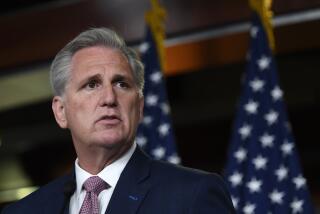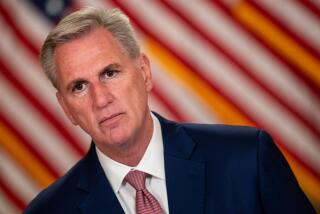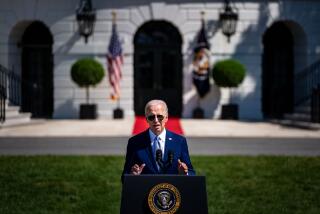Calls ‘Economic Freedoms’ Proposals ‘Shopworn’ : Byrd Assails Reagan’s Tax Curb Plan
WASHINGTON — President Reagan’s call Friday for a constitutional amendment to limit tax increases drew sharp criticism from the Democratic leader of the Senate, who said the President delivered “shopworn ideas . . . wrapped in patriotic bunting.”
The President, marking the 211th year of the republic, turned the steps of the Jefferson Memorial into his podium to call for adherence to “economic freedoms” that he said were “inextricably linked” to the political freedoms envisioned by Thomas Jefferson and the other Founding Fathers in the Declaration of Independence.
Amendment Needed
In a speech that was a composite of hundreds of addresses he has delivered in a political and public speaking career that dates back more than two decades, the President proposed that an unspecified majority greater than the simple majority now required be mandated for approval of tax increases in Congress--a step that would require a constitutional amendment.
He called also for “truth in spending” legislation that would spell out the ultimate costs of any new government program, many years into the future, and specify how the money to pay those costs would be raised.
“The working people of this country need to know their jobs, take-home pay, homes and pensions are not vulnerable to the threat of a grandiose, inefficient and overbearing government, something Jefferson warned us about 200 years ago,” Reagan said.
“It is time,” he continued, “to finish the job Jefferson began and to protect our people and their livelihoods with restrictions on government that will ensure the fundamental economic freedom of the people, the equivalent of an Economic Bill of Rights.”
The address, at the start of a holiday weekend, was intended to draw attention to Reagan’s fight with Congress over the 1988 federal budget, at a time when he is struggling to restore momentum to his presidency in the wake of the Iran- contra affair.
‘Real Solution’ Urged
The speech was promptly criticized by Sen. Robert C. Byrd (D-W. Va.), the Senate majority leader, who said that the President “should sit down with the Congress and work with us on the real solution to our deficit crisis.”
Reagan, who has yet to achieve a balanced budget in his 6 1/2 years in office, has presided over a federal government that is $2.3 trillion in debt--more than twice what the nation owed when he took office. Interest on the debt will cost taxpayers $140 billion next year.
“What the American people really need is not a speech in front of the Jefferson Memorial filled with shopworn ideas and wrapped in patriotic bunting,” Byrd said. “What this country needs is a Declaration of Independence, independence from the Reagan deficits, independence from the Reagan debt.”
The budget resolution approved on June 24 by the Senate, and a day earlier by the House, envisions $1.04 trillion in federal spending next year and a deficit of $134 billion.
It would increase taxes by $19 billion next year and would raise the Pentagon budget to $296 billion, from the current level of $289 billion, but only if Reagan accepts the tax hike--a step he opposes.
Sen. John Kerry (D-Mass.) said that Reagan’s tax proposal “fundamentally challenges democracy” because “he wants a minority to govern with his super-majority proposal. He’s trying to undo 200 years of constitutional process that has worked.”
Power for Minority
By suggesting that a majority greater than the 50% plus one be required before a tax increase proposal may be sent to the President, Reagan, in effect, would give a minority the ability to block a tax increase. Under current law, tax increases may be approved by a simple majority and are then signed or vetoed by the President.
Reagan spoke to an audience of several hundred people, most of them government appointees and guests of the U.S. Chamber of Commerce, which organized the gathering.
At the outset, Reagan stripped off his jacket on the scorching morning and delivered his speech in his shirt-sleeves, French cuffs held together by gold cuff links, with a larger-than-life statue of Thomas Jefferson standing behind him in the shadows of the memorial’s white marble rotunda.
More to Read
Get the L.A. Times Politics newsletter
Deeply reported insights into legislation, politics and policy from Sacramento, Washington and beyond. In your inbox three times per week.
You may occasionally receive promotional content from the Los Angeles Times.










